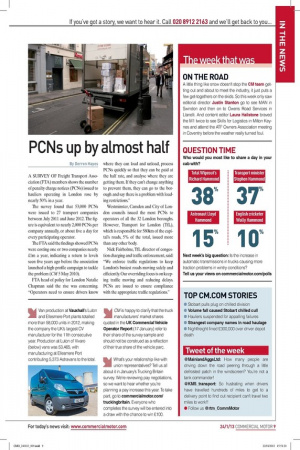PCNs up by almost half
Page 7

If you've noticed an error in this article please click here to report it so we can fix it.
By Derren Hayes A SURVEY OF Freight Transport Association (FTA) members shows the number of penalty charge notices (PCNs) issued to hauliers operating in London rose by nearly 50% in a year.
The survey found that 53,000 PCNs were issued to 27 transport companies between July 2011 and June 2012. The figure is equivalent to nearly 2,000 PCNs per company annually, or about five a day for every participating operator.
The FTA said the findings showed PCNs were costing one or two companies nearly ilm a year, indicating a return to levels seen five years ago before the association launched a high-profile campaign to tackle the problem (CM 5 May 2010).
FTA head of policy for London Natalie Chapman said the rise was concerning. "Operators need to ensure drivers know where they can load and unload, process PCNs quickly so that they can be paid at the half rate, and analyse where they are getting them. If they can't change anything to prevent them, they can go to the borough and say there is a problem with loading restrictions."
Westminster, Camden and City of London councils issued the most PCNs to operators of all the 32 London boroughs. However, Transport for London (TfL), which is responsible for 580km of the capital's roads, 5% of the total, issued more than any other body.
Nick Fairholme, TfL director of congestion charging and traffic enforcement, said: "We enforce traffic regulations to keep London's busiest roads moving safely and efficiently. Our overriding focus is on keeping traffic moving and reducing delays. PCNs are issued to ensure compliance with the appropriate traffic regulations."










































